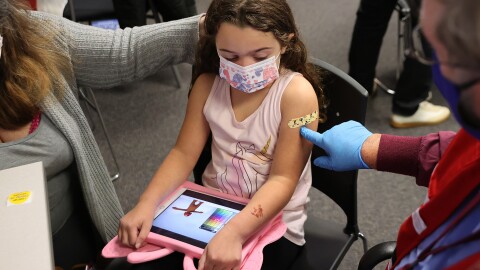COVID-19 vaccines for Ohio’s youngest children are expected to be authorized by the Food and Drug Administration (FDA) in the coming days, and Ohio’s Department of Health said that the state is well supplied and well organized to provide the shots.
Officials have been working to get vaccines “prepositioned” in pediatricians' offices. Once approved for kids ages 6 months to age 4-years-old, practitioners will have what they need to provide the shots, said state health department director Dr. Bruce Vanderhoff, during a press conference Thursday.
Vaccines will be available at pediatrician offices and pharmacies statewide, officials said.
The Moderna vaccine is a two-shot series, Dr. Vanderhoff said. Pfizer requires three.
If parents have questions about vaccinating a young child, Dr. Michael Forbes of Akron Children's Hospital urges them talk to their doctor.
“Public health is critical, but it really relies on private choices, and we want those choices to be informed," he said.
The benefits of vaccination far outweigh the risks, he said.
"As a parent, we do want to prevent the preventable," Dr. Forbes said.
The vaccine also prevents serious illnesses that could result in hospitalization or death, Vanderhoff said.
Although many get milder infections, kids are not immune to the disease, which puts them at risk of serious symptoms, long-haul COVID and multisystem inflammatory syndrome (MIS-C), a condition marked by a life-threatening inflammatory response that sometimes follows a COVID-19 infection and can land kids in intensive care.
“When we see preventable illnesses in the ICU it is gut-wrenching,” Forbes said.
Vaccination also helps ward off long-COVID and MIS-C, he said.
Side effects for the youngest children are similar to those seen in other age groups: mild to moderate soreness at the injection site that resolves in a couple of days, fatigue and irritability, said Dr. Grant Paulsen, a pediatrician in the Division of Infectious Diseases at Cincinnati Children's Hospital, who was involved in both the Moderna and Pfizer vaccine trials.
A small share of children may also develop fevers at some point in the vaccine series, he said. That’s more likely if they get the Moderna shot than the Pfizer vaccine, he added.
“The prevention is really key. Any illness we can prevent we’re better off than trying to treat it,” Paulsen said.
Copyright 2022 WKSU. To see more, visit WKSU.


